Conveniently, I have acquired a number of new cookbooks that I've been meaning to test. To that end I have begun planning! We've divided the meals for the weekend between us and invited two other attendees to deal with breakfasts. We'll share Friday night supper and Monday morning breakfast; I'm responsible for lunch and feast on Saturday while she'll be doing feast and supper on Sunday. Should work well. At least we won't be under one another's feet.
Lunch is going to be a repeat of last year's lunch. It was fun to cook and everyone seemed to enjoy it. The only thing I'm planning to change is making more flatbread.
The feast is going to be a little more complicated. The general sense of what makes a feast is that it should have a wider range of dishes and be presented beautifully, as well as possibly involving some sort of entertainment between courses. The entertainment is not my job, but I think I can handle the rest. I've decided on a Tudor feast, both because of the 1545 project and because I've a cookbook with redacted versions of Tudor recipes to work from. (Redactions being interpretations with amounts written in, they are much easier to cook from than recipes that call for "enough flour to make the dough".) The chap who's done the redactions is also the person who coordinates the food in the Tudor kitchen at Hampton Court, so while I'd eventually like to do my own redacting, I'm confident that his are a reasonably accurate starting point.
My personal preference is to have each course be roughly half meat and half vegetables or fruit, plus bread. After trawling through the cookbook, what I'm thinking at the moment is this for the first course:
- a compound salad (greens, fruit, pickled things, flowers)
- lamb stewed in beer
- fried pork sausages
- strawberry tart
- beans fried in butter
- meatball pears (not sure what meat yet)
- cabbage cooked in stock
- chicken and bacon pie
This evening I'm testing the lamb in beer. Recipe comes originally from a cookbook dated 1557. The recipe calls for a leg of mutton from which one removes the meat and slices it into thin strips. Since I'm not going to have any use for a bone I've gotten chunks, and since most people prefer it I've gotten lamb.
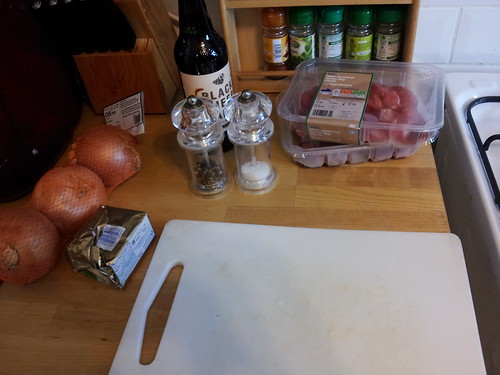
Basically, you throw the lamb, a sliced large onion, and a bottle of brown ale into a pot.
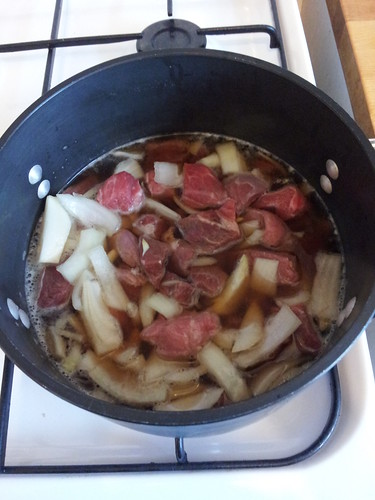
Simmer it for an hour, then throw in a knob of butter and some salt and pepper before simmering for another 20-30 minutes.
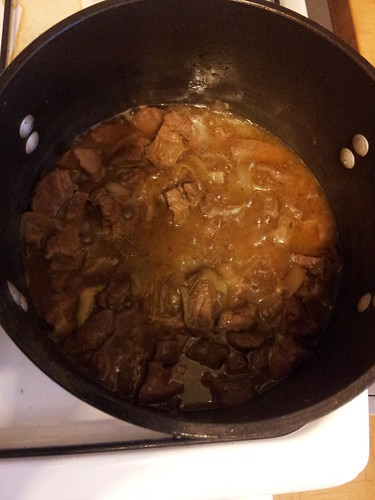
The lamb is fork-tender and flavourful. A bit bitter, though, so I'll need to pick a different beer. (Fantasy project - making the recipe with beer brewed from a 16th-century recipe.) The beer boiled over if looked at funny, so it'll need careful watching. Otherwise, complete success, definitely on the menu.
Also testing out the filling for a strawberry tart. Recipe from 1665, but similar recipes appear in earlier cookbooks. I'm not worried about the pastry, so for today I was lazy and bought a prebaked shortbread crust. The tart filling is strawberries, red wine, cinnamon, ginger, and sugar.
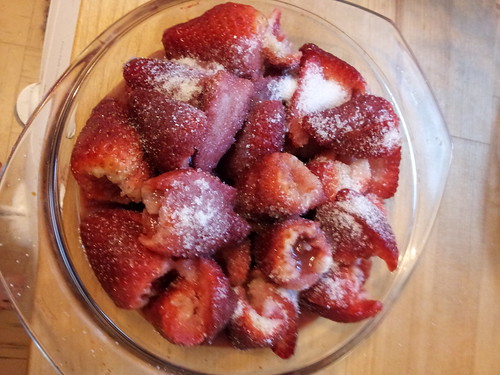
You're supposed to arrange everything artfully in the pastry case and then bake it for half an hour, but I've just baked the filling separately and poured it over the crust for tonight's dessert.
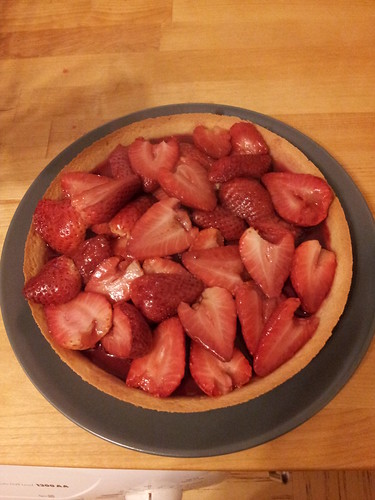
Verdict - omnomnomnom. This is probably going to be added to the regular dessert rotation.
No comments:
Post a Comment